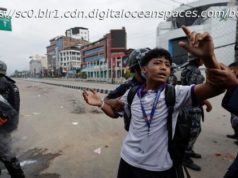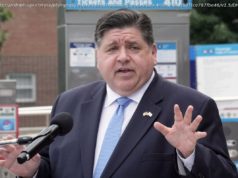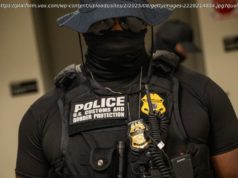President Trump faces two lawsuits stemming from a 2016 event: one filed by a black woman who was pushed toward the exit, and another by a white nationalist who tried to remove her.
Eight months before Election Day, Donald J. Trump was about a half-hour into his stump speech at a convention center in Louisville, Ky., when several protesters interrupted his rally. “Get’ em out of here!” he bellowed in response.
Matthew Heimbach, a white nationalist wearing a red “Make America Great Again” hat, gave a hard shove in the back to Kashiya Nwanguma, a black college student who had been holding up a poster depicting Mr. Trump’s face on the body of a pig.
“He knew what he was asking for, ” Mr. Heimbach said recently of Mr. Trump’s remark.
What Mr. Trump got was a pair of lawsuits: one filed by Ms. Nwanguma and the other by one of Candidate Trump’s most fervent young admirers among the white nationalist movement, Mr. Heimbach.
Two months after the March 2016 rally, Ms. Nwanguma and two other protesters sued Mr. Trump, the Republican presidential candidate, contending incitement, saying he was legally liable because Mr. Heimbach and other Trump supporters were acting as his “agents.” The civil suit also accuses Mr. Heimbach and two other Trump supporters of assault and battery, adding that they shouted racial slurs at her.
In a separate lawsuit filed last month, Mr. Heimbach, 26, demanded indemnity from Mr. Trump, saying he was responsible for any injuries Mr. Heimbach might have inflicted because Mr. Trump directed him and others to take action. The suit also requests that Mr. Trump pay Mr. Heimbach’s legal fees, citing a promise Mr. Trump made at an earlier rally to pay legal costs of anyone who removed protesters.
Plenty of people have sued Mr. Trump over the years, but the president has probably not previously faced quite such esoteric legal arguments, not to mention a demand for payment from someone who says he represents the white working-class voters who helped propel him into the White House.
Mr. Heimbach, who is not a lawyer, said he had written and filed the lawsuit after long hours spent at local law libraries near his home in rural southern Indiana. He is a self-employed landscaper, but spends much of his time railing online against Jews, gays and immigrants and urging whites to stand up for their race.
Mr. Heimbach is a founder of the Traditionalist Youth Network, which advocates separate American “ethno states” based on race, ethnicity and religion. The Southern Poverty Law Center lists the network as a hate group and has called Mr. Heimbach “the face of a new generation of white nationalists.”
In a 2015 blog post, Mr. Heimbach wrote, “Donald Trump is blowing the dog whistle for white racial interests harder than any other candidate.” While he said he no longer supported the Trump administration because it had “betrayed” white workers on several issues, Mr. Heimbach noted “the mobilized and enthusiastic white working class” Mr. Trump helped energize.
Mr. Heimbach’s claim of indemnity — and his demand that Mr. Trump honor his promise to pay legal fees — is highly unusual, legal experts say. But his counterclaim against Mr. Trump has nonetheless probed the limits of free speech and public protest while confronting the courts with a unique legal argument.
“You certainly don’ t see that very often, ” said Leslie Kendrick, a law professor at the University of Virginia, referring to a defendant’s seeking a free legal pass and legal fees for acts committed at the behest of a stranger — who in this case happened to be the future president. Indemnity, or impleader, cases typically involve workplace or business relationships.
Samuel Issacharoff, a professor of constitutional law at New York University, said there was no blanket immunity for incitement. “But in the context of a political rally we need to be really, really careful before we start allowing speech to be turned into something that is legally sanctionable, ” Mr. Issacharoff said in a telephone interview.
The central issue raised by the federal civil suits, he said, “is how society should deal with the passions which are necessarily unleashed in political events.” He added, “The courts bend over backward to protect the freedom of political exchange in this country, even when it’s ugly.”
Lawyers for Mr. Trump have successfully argued that he was not “vicariously liable” for his supporters’ actions because they were not acting as his agents. A court dismissed Ms. Nwanguma’s liability claim in March, but denied a motion to dismiss the incitement claim.
Citing the liability ruling, Mr. Trump’s lawyers contended in legal filings on May 5 that Mr. Heimbach’s indemnity claim should be dismissed on the same grounds.
The lawyers also said Mr. Trump’s public statements were protected by the First Amendment. They said there was no evidence Mr. Trump intended for his followers to harm anyone. They quote him as saying at the rally, “Don’ t hurt them.”
The suits are among many civil actions pending against the president. Legal experts said they were not likely to be resolved anytime soon.
Even so, Ms. Kendrick said, “this case raises all the same questions that everyone was debating during the campaign — it underscores that these were not just hypothetical questions.”
According to Mr. Heimbach, Ms. Nwanguma and other protesters harassed, cursed and intimidated Trump supporters at the Louisville rally. He said Ms. Nwanguma had raised her middle finger in his face. The protesters infringed on his constitutional right to peacefully assemble to hear his candidate, he said.
Because Mr. Trump had rented the venue, Mr. Heimbach said, the candidate had authority to instruct his followers to remove protesters. Mr. Heimbach’s suit says he relied on the “expertise and authority” of Mr. Trump and his campaign when he helped remove protesters.
He and others were acting in the best interests of public safety “to remove the threat to ourselves and to other members of the crowd, ” said Mr. Heimbach, who lives in Paoli, Ind.
He denied shouting racist slurs, saying he merely called Ms. Nwanguma a “leftist.”
In his suit, Mr. Heimbach quoted statements by Mr. Trump at other rallies urging supporters to remove protesters. In Cedar Rapids, Iowa, on Feb. 1,2016, Mr. Trump told supporters to “knock the crap out of” anyone preparing to throw a tomato.






